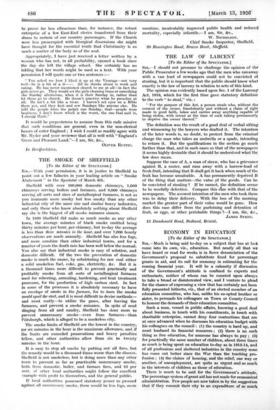THE SMOKE OF SHEFFIELD [To the Editor of the SPECTATOR.]
Sin,—With your permission, it is in justice to Sheffield- to point out a few fallacies in your leading article on " Smoke Abatement " in the Spectator of March 6th.
Sheffield with over 100,000 domestic chimneys, 1,000 chimneys serving boilers and furnaces, and 8,000 chimneys serving all sorts and sizes of metallurgical furnaces, is not as you insinuate more smoky but less smoky than any other industrial city of the same size and similar heavy industries, and only those who know absolutely nothing about Sheffield say she is the biggest of all smoke nuisance sinners.
In 1890 Sheffield did make as much smoke as any other town, the average minutes of black smoke emitted being thirty minutes per hour, per chimney, but to-day the average is less than three minutes in the hour, and over 7,000 hourly observations are made annually. Sheffield has also less fogs, and more sunshine than other industrial towns, and for a number of years the death rate has been well below the normal. You also say that industrial smoke is easy of solution, and domestic difficult. Of the two the prevention of domestic smoke is much the easier, by substituting for raw coal either a solid smokeless fuel, coke, gas, electricity, &c. But it is a thousand times more difficult to prevent practically and profitably smoke from all sorts of metallurgical furnaces used for reheating, annealing, hardening, and heat treatment processes, for the production of high carbon steel. In fact in some of the processes it is absolutely necessary to have an envelope of smoke in the furnace, for to burn the smoke mould spoil the steel, and it is most difficult to devise methods— and most costly—to utilize the gases, after leaving the furnaces, and prevent a smoke nuisance. In spite of mud slinging from all and sundry, Sheffield has done more to prevent unnecessary smoke—even from furnaces—than Pittsburgh, which is alleged to be a smokeless city.
The smoke limits of Sheffield are the lowest in the country, for six minutes in the hour is the maximum allowance, and if the limits are exceeded prosecutions and heavy penalties follow, and other authorities allow from six to twenty minutes in the hour.
It is easy to stop all smoke by putting out all fires, but Vie remedy would be a thousand times worse than the disease. Sheffield is not smokeless, but is doing more than any other town to prevent as far as practicable unnecessary smoke, both from domestic, boiler, and furnace fires, and 95 per- cent. of other local authorities might follow the excellent example with profit to themselves, and the general public.
If local authorities possessed statutory power to proceed against all unnecessary smoke, there would be less fogs, more sunshine, incalculably improved public health and reduced mortality, especially infantile.—I am, Sir, &c., W. NienoLsow, Chief Smoke Inspector, Sheffield.
39 Rossington Road, Brocco Bank, Sheffield.






























































 Previous page
Previous page